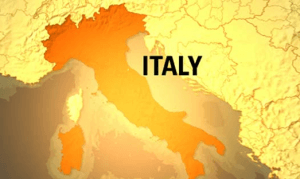About 60,000 Ghanaians live in Italy legally
 There are about 60,000 Ghanaians living in Italy legally, according to an Italy Embassy official.
There are about 60,000 Ghanaians living in Italy legally, according to an Italy Embassy official.
Mr Lorento Pinelli, Deputy Head of Mission at the Embassy of Italy, said 60,000 Ghanaians currently lived in Itally by regular means, adding that between January to August this year, 120,000 illegal migrants entered Italy.
But Mr James Agalga, Deputy Minister of the Interior on Tuesday said between January and August this year, at least 350,000 immigrants have crossed the EU borders into Europe.
More than 2,600 people have drowned in the Mediterranean this year trying to reach Greece or Italy with unsafe fishing boats, he noted.
He said the Ministry was informed that from January to June this year, at least 3,500 Ghanaians have reached Italy using irregular means of migration.
Mr Agalga disclosed this at a day’s sensitization workshop on the National Migration Policy (NMP) aimed at creating awareness, and galvanizing support from stakeholders from the Central, Eastern, Volta and Greater-Accra Regions, for the policy implementation process in Ghana.
The policy is formulated by the Ministry under the auspices of the inter-ministerial steering committee on migration, with support by the International Organisation for Migration (IOM), and the United Nations Development Programme (UNDP), with funding from the European Commission (EC).
The policy which has been approved by cabinet will provide guidance for the holistic management of migration in Ghana.
Mr Agalga said the issues of migration called for drastic intervention on the part of governments globally to address migration holistically.
The Deputy Minister said in recent times, Europe had been experiencing one of the most significant influx of migrants and refugees in its history, pushed by civil war and terror and pulled by the promise of a better life.
Hundreds of thousands of people have fled the Middle East and Africa, to Europe, risking their lives along the way.
Mr Agalga said Ghana had experienced migration of its highly skilled citizens to the developed world, and to other parts of Africa, especially for those seeking greater economic opportunities since the 1970s.
He said this had posed major challenges for the national development, adding however, that it was instructive to note that this trend had changed over the years due to successive governments interventions.
The Deputy Minister indicated that migration issues shall be mainstreamed into the sectorial development plans, adding that, this explained why the Ministry was collaborating with the National Development Planning Commission to infuse the National Migration Policy into the medium and long-term developing agenda of the NDPC.
He expressed the hope that with the implementation of the strategies, government was in the right direction to deal with migration challenges of all forms.
Mr Lorento Pinelli, Deputy Head of Mission at the Embassy of Italy, said 60,000 Ghanaians currently lived in Itally by regular means.
He said between January to August this year, 120,000 illegal migrants entered Italy.
He said people migrated to Italy for either economic reasons or were asylum seekers because they came from countries that were internationally recognized to seek asylum from Liberia, Serrra Leone, Nigeria. Cote D’Ivoire, Senegal and Eastern Africa.
He said it was obvious that people would migrate, but “we must stop people from risking their lives,” adding that the participation of the Italian Embassy was to listen to the side of Ghana so that together a solution could be found.
Mr Daniel Kweku Sam, National Project Officer in charged of Migration and Development, said it was estimated that migration was inevitable, necessary and yet desirable if well managed.
He said it was estimated that given a world population of seven billion, one billion would constitute migrants (one in every seven people), 232 million international migrants, 740 million internal, of which 50.2 million forcibly displaced, 16.7 million refugees, 33.3 internally displaced persons and 1.2 million asylum seekers.
Mrs Adelaide Anno-Kumi, Chief Director, said the need for the introduction of a national migration policy in Ghana was long over, because migration issues had become a global phenomenon that most governments across the globe were grappling with.
Prof Mariama Awumbilla, of the Legon Centre for Migration Studies, giving an overview of the policy, said it covered 13 key areas with well designed strategies to address various issues, including; internal migration, forced displacement beyond national borders, migration, environment and climate change, migration and gender, diaspora, dual citizenship and transnationalism, migration data and information management and resource mobilization.
She said an action plan had also been put in place with the various actors who would implement the policy.
Prof Awumbilla said an institutional framework for the NMP had been suggested, and crucial among these was the establishment of a Ghana National Commission on Migration, as a body specifically mandated to manage migration and migration-related issues in line with the policy.
Source: GNA
